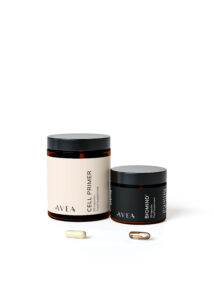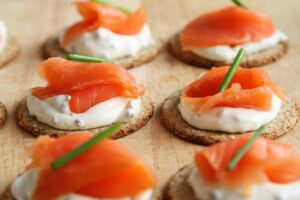You wake up feeling a little more tired than usual. Your joints ache, your energy is low, and despite your best efforts, the fatigue just won’t fade.
These are the subtle signals your body is sending—signs of chronic inflammation quietly working in the background. It isn’t always obvious, but it could be the reason why you’re not feeling your best.
Chronic inflammatory diseases are responsible for 3 out of 5 deaths worldwide, contributing to serious conditions like heart disease, stroke, and diabetes. But here’s the good news: reducing inflammation doesn’t have to take much of your time, money, or energy.
With just a few targeted lifestyle changes, you can actively reduce inflammation and regain control of your health.
In this Avea article, we’ll guide you through simple, science-backed strategies to lower inflammation, protect your long-term wellbeing, and boost your vitality.
Ready to feel better and start your longevity journey right? Discover the 10 science-backed habits that will help reduce inflammation in your body.
In this article
Age in reverse with Avea’s FREE guide

- Master the science of rejuvenation.
- Apply proven tips to turn back the clock.
- Transform your health with top longevity specialists.
What is inflammation?
Inflammation is your body’s natural defence mechanism. When you get injured or encounter an infection, your immune system sends white blood cells to the affected area to protect and heal you.
This type of short-term response is called acute inflammation, and it’s a vital part of the healing process. Think of it like your body’s first-aid kit—quick, effective, and temporary.
But when inflammation lingers, it can become a problem. Chronic inflammation is a low-level, persistent state that occurs when your immune system stays on high alert, even without a specific threat.
Unlike acute inflammation, chronic inflammation can quietly damage tissues and organs over time. It’s often invisible but can contribute to serious health issues such as heart disease, diabetes, arthritis, and even premature ageing.
The danger lies in the fact that you may not feel the effects of chronic inflammation right away, but its long-term impact on your body can be significant. Discover what causes inflammation in your body here.
Why should we reduce inflammation
Over time, this low-level inflammation contributes to serious, life-altering conditions such as:
- Heart disease
- Cancers
- Diabetes
- Autoimmune disorders (e.g., rheumatoid arthritis, lupus)
- Neurodegenerative diseases (e.g., Alzheimer’s, Parkinson’s)
- Chronic respiratory diseases (e.g., asthma, COPD)
- Premature ageing (affecting skin, joints, and energy levels)
Not only does it increase the risks of such chronic diseases, but chronic inflammation also affects your life on a daily basis.
If you want to start taking care of yourself and your loved ones, there are a few simple, science-backed ways to keep in mind, if you want to keep inflammation in check.
Let’s dive into 10 proven strategies to help you get started.
Top 10 science-backed ways to reduce inflammation naturally
1. Fuel your body with anti-inflammatory foods
The easiest way to fight inflammation? Choose foods that work with your body, not against it. Think leafy greens, berries, fatty fish, nuts, and seeds—all packed with anti-inflammatory properties to keep your health in check.
2. Cut out the foods that cause inflammation
Processed foods, refined sugars, and trans fats might taste great, but they’re also speeding up inflammation in your body. Once you start avoiding these, you’ll start appreciating the beauty of whole foods. Discover 15 foods that cause inflammation.
3. Embrace the Blue Zone diet
The Blue Zone diet, rich in vegetables, legumes, and whole grains, is linked to longer, healthier lives. Make it a regular part of your week to fight inflammation and boost your longevity.
4. Get moving and sweat it out
Dr. David Sinclair, a longevity expert, stresses the importance of getting out of breath daily, even if it’s just for 10 minutes.
Vigorous activity, like strength training or cardio, helps reduce inflammation and triggers autophagy, your body’s natural cleaning process.
Simple movements, like hip hinges or using a standing desk, can also make a difference. The key is consistency—whether it’s lifting weights or just walking more, your body thrives on movement. Discover how to exercise for longevity with tips from 4 longevity experts.
5. Master your mind
Chronic stress is one of the biggest contributors to inflammation. Learning to regulate your emotions and manage stress effectively is key to protecting your long-term health.
Dr. Aditi Nerurkar, a renowned stress expert, highlights that stress not only affects mental well-being, but also drives inflammation and burnout.
Discover how to master stress and build resilience with Dr. Aditi Nerurkar.
6. Make quality sleep a non-negotiable
Quality sleep is one of the most powerful tools for reducing inflammation and boosting longevity. Research shows that it’s not just how long you sleep, but also when you sleep and how consistent your routine is.
‘’Make sleep your No.1 priority.’’ –Bryan Johnson
7. Consider anti-inflammatory supplements
Incorporating longevity supplements can be a powerful way to combat chronic inflammation.
Avea’s Inflammaging Routine is a carefully designed duo to help you address the root cause of ageing—chronic inflammation.
Science-backed natural anti-inflammatory supplements

- Reduces inflammation.
- Boosts mitochondrial function.
- Enhances metabolic flexibility.
- Supports brain health.
The routine includes:
- Biomind: A next-gen probiotic that supports gut microbiome balance, reducing systemic inflammation.
- Cell Primer: Contains senolytics and antioxidants to clear senescent cells, promote autophagy, and enhance mitochondrial health.
Remember, supplements should be used to support—not replace—balanced nutrition and lifestyle choices.
8. Ditch habits that drain you
Over time, certain routines that once felt beneficial might start draining your energy and wellbeing.
Habits like overcommitting, constantly checking your phone, or staying in toxic environments can gradually chip away at your mental peace and physical health.
These habits increase cortisol levels, a stress hormone that, in excess, leads to inflammation by raising markers like CRP (C-reactive protein).
Letting go of these draining patterns allows your body to recalibrate. Studies show that breaking away from unhealthy habits lowers inflammation and reduces the risk of long-term health issues, giving you a fresh start to thrive.
9. Try intermittent fasting
Intermittent fasting (IF) taps into your body’s natural ability to repair itself. During fasting periods, your body shifts from focusing on digestion to repairing cells, triggering a process called autophagy.
Studies show that IF can lower levels of pro-inflammatory markers like TNF-alpha, IL-6, and CRP, reducing inflammation and promoting overall metabolic health.
In addition to giving your digestive system a rest, fasting also helps reduce insulin resistance, which is closely linked to inflammation. Discover how to build an insulin resistance diet.
10. Add more herbs and spices in everyday meals
Certain herbs and spices are nature’s most potent anti-inflammatory agents.
Turmeric, known for its active ingredient Curcumin, has been shown to block molecules involved in inflammation.
Understand the science behind Avea’s Mobiliser, containing the most bioavailable form of Curcumin in a supplement.
Ginger contains gingerol, a compound that reduces oxidative stress and inflammation, helping lower the risk of chronic diseases like arthritis.
Rosemary has powerful antioxidant properties that neutralise free radicals, which are a major cause of chronic inflammation.
Incorporating these spices into your meals is an easy and natural way to enhance your body’s ability to fight inflammation.
Studies show that these spices also support overall immune function, making them a must for any anti-inflammatory diet.
Science-backed natural anti-inflammatory supplements

- Reduces inflammation.
- Boosts mitochondrial function.
- Enhances metabolic flexibility.
- Supports brain health.
How long does it take to see results?
Reducing inflammation is a gradual process. Whilst it’s tempting to expect quick changes, it’s important to understand that chronic inflammation builds over time and won’t disappear overnight. Improvements typically happen progressively, and it’s crucial to stay patient.
You may start to notice subtle shifts in your energy levels, digestion, and overall well-being within a few weeks of adopting an anti-inflammatory lifestyle.
These small changes are indicators that your body is healing and recalibrating, so pay close attention to these signs as you move forward.
Common FAQs on reducing inflammation
Q1. Does inflammation cause weight gain?
Yes, chronic inflammation can disrupt your metabolism and contribute to weight gain, especially around the abdominal area. Inflammation can increase insulin resistance, making it harder for your body to regulate blood sugar and store fat efficiently.
Q2. What does an anti-inflammatory grocery list look like?
An anti-inflammatory grocery list should include foods rich in antioxidants, healthy fats, and fibre.
Some great choices are:
- Leafy greens like spinach and kale
- Berries (blueberries, strawberries)
- Fatty fish (salmon, mackerel)
- Nuts (almonds, walnuts)
- Olive oil
- Whole grains (quinoa, brown rice)
Q3. What tea helps with inflammation?
Green tea, ginger tea, and turmeric tea are known for their anti-inflammatory properties.
Q4. What foods are inflammatory?
Processed foods, refined sugars, trans fats, and high-sodium snacks are major contributors to inflammation. Discover the top 15 foods that cause inflammation in the body.
Keynote from Avea
Reducing inflammation is all about small, consistent changes that lead to big results.
Whether you begin by eliminating sugar, managing stress, or adding an anti-inflammatory supplement like Avea’s Inflammaging Routine, every positive shift makes a difference.
Remember, you don’t have to make all the changes at once. Start with baby steps.
Over time, you’ll feel the impact, and your body will reward you with greater longevity and vitality.
This journey is about taking control of your health, one mindful step at a time.
















